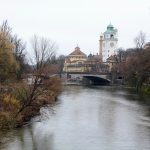
Munich, home of Oktoberfest and lederhosen, Viktualienmarkt, and weisswurst. And…coffee. Yes, the southern Bavarian city has a drinking tradition besides beer! If you’ve ever been to Munich, you might have even come across the name Dallmayr, a famous coffeehouse and roaster (among other things) for more than 300 years.
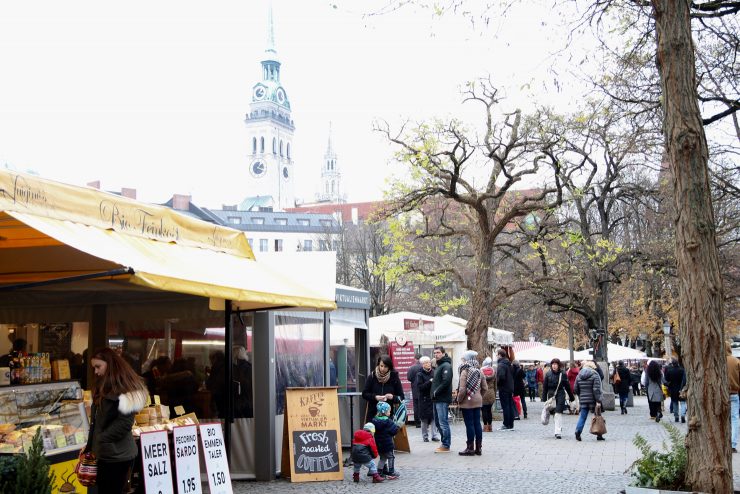
Munich’s Viktualienmarkt
Munich is also known as the “northernmost city of Italy.” The inhabitants of Munich love to stroll around, to sit outside, to see and be seen. If the Italian coffee tradition is still slightly out of reach, Munich is interested and learning.
For your next visit, coffee fan, you might want to take more time to explore the city beyond the usual sights, because Munich’s specialty coffee scene has been evolving over the past five years, with two new cafes just opened in fall 2016. Since 2015 Munich has also been home of the 2016 German Coffee Championships, which took place in November, and the city’s coffee future is bright.
Mahlefitz
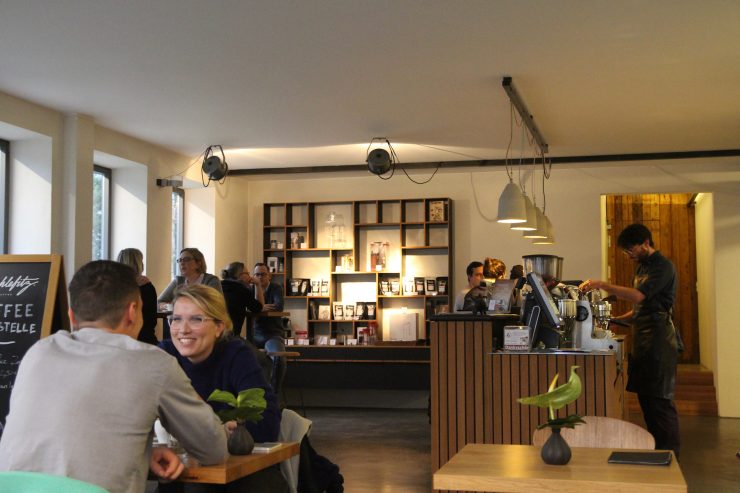
Peter Schlögl, owner of Mahlefitz, has a background in wine. The way to specialty coffee, as we know, is not far from there: both offer broad varieties in flavors and approaches. Mahlefitz, Schlögl’s roastery and cafe, opened in January 2014. His roasting style, as well as the interior design of the cafe, are very much inspired by Scandinavia. The chairs, for example, are vintage from 1950s and ’70s Denmark. The roasts that come through his Loring roaster—one of only two of its type in Germany—are light, bright, and juicy.
The keen-eyed might notice one detail, something many specialty shops aim for (but usually concede to customer demand): there’s no sugar here. If you try the espresso, though—pulled with a Synesso—you can taste the sweet precision that goes into every shot. That said, you should definitely try one of the cakes for your sweet tooth, or, if you’re up for something more savory, a freshly made sandwich or the housemade granola.
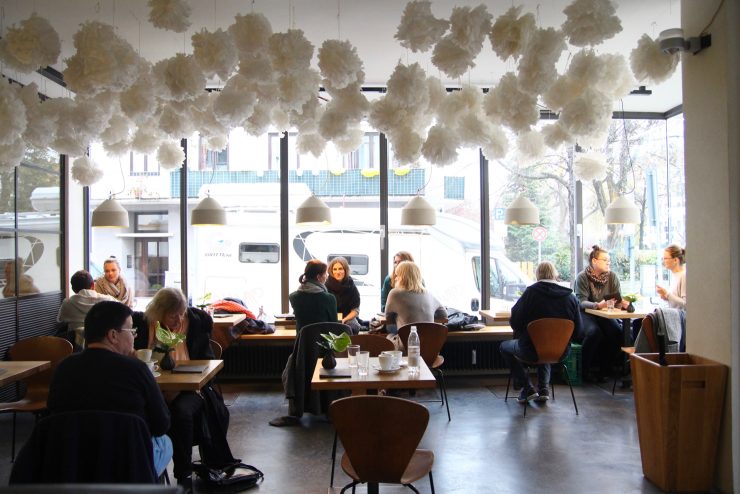
After three years in business with Mahlefitz, Schlögl is ready to launch a mobile version. “It is my approach to offer as much as possible of the coffee supply chain, from green coffee to the cup,” he says. “With the espresso bike, I want to take the next step.” The bike will begin traversing the city later this year.
Man Versus Machine
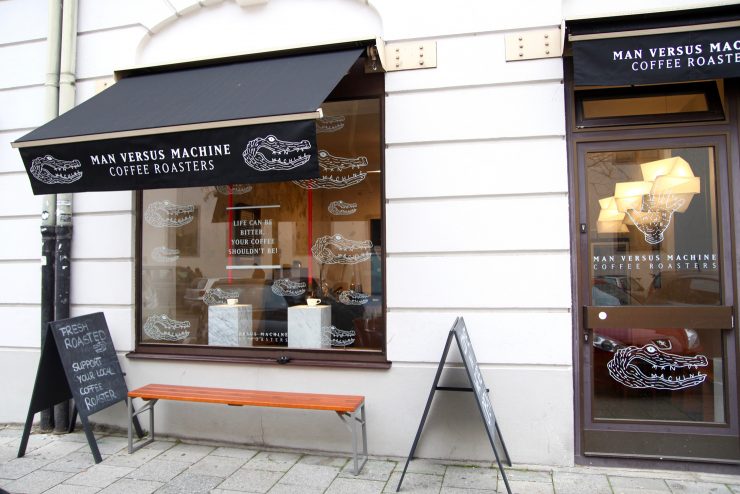
It was my second time visiting Man Versus Machine and my second time talking to Marco Mehrwald, one of the owners. This time, though, I was at Man Versus Machine’s new location in Munich’s Maxvorstadt district, right next to a new university. Both of the cafes show the love for Japan and its culture shared by Mehrwald and Cornelia Mehrwald, his wife and co-owner (exemplified by the huge, folding, indigo-blue fabric on the wall of the new cafe). The Mehrwalds’ personalities can be seen in their beverages and coffee equipment (such as several Japanese teas and Hario filter-brewing gear), as well as in their design choices: the instruction they gave Jon Contino, the designer of their striking logo—a crocodile—came out like this: Scandinavian freshness meets California skate culture meets Japanese attention to detail.
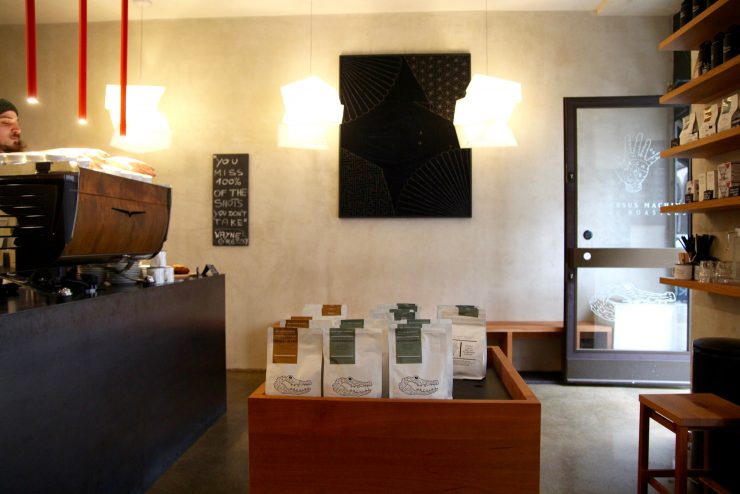
Besides the light-roasted coffees—via the Probat roaster in Man Versus Machine’s first location, in Munich’s Glockenbachviertel—shipped to coffee lovers and specialty cafes all over Europe, as well as the specialty tea also offered in the new cafe, the espresso at the new location is made with a custom-designed Nuova Simonelli Black Eagle. For filter coffee, you can choose between a BUNN batch brewer or hand-filtered with an AeroPress, Kalita, or syphon. The Maxvorstadt spot also offers the famous Franzbrötchen, another personal touch from the Mehrwalds, since the famous pastry originally hails from Hamburg, where both used to live.
Café Blá
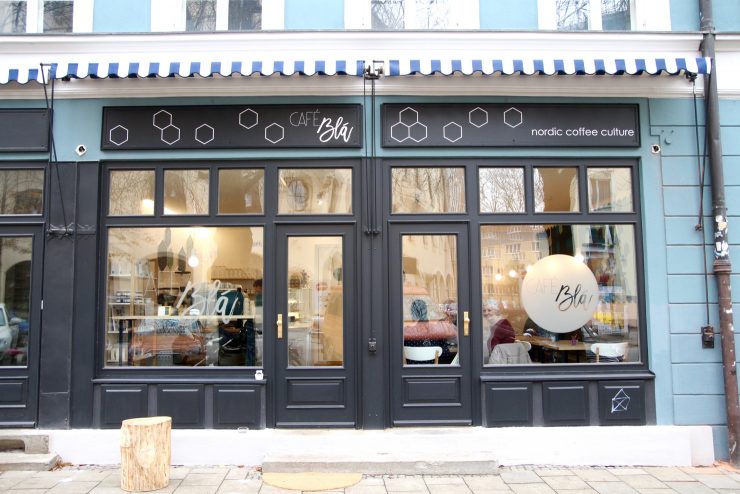
Blá means “blue” in Icelandic, and this cafe’s interior and design details reflect the color in a consistent but restrained way. As I sit down with Stephanie Bjarnason, the owner of Café Blá, I notice her shirt is the same color. Bjarnason is an engineer who turned her dream of having her own specialty cafe into a reality at the end of October. Both her personality and that of her homeland, Iceland, shine through in the cafe and also her conversation.
“Coffee, filter coffee, is always the focus in Iceland,” she says. “When someone asks you to meet for tiu dropar—’10 drops’ in Icelandic—they want to meet for coffee. Every household even used to roast its own coffee, in a pan on the stove.” As it is back home, Bjarnason’s focus is on filter coffee. Of course, she offers espresso—pulled from the blue La Marzocco GB5—and with the help of Vits der Kaffee (see below) even created the cafe’s own espresso blend: Àlfrún, which means “secret of the elves.” (The secret in this case is notes of citrus fruit as well as chocolate.)
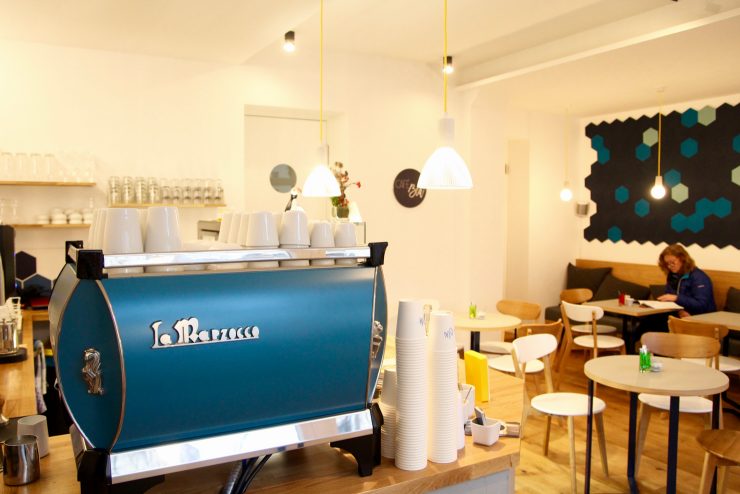
As for Café Blá’s single-origin coffees, two varying filter roasts and espresso roasts are offered, with one of them—right now an Ethiopia Samii—being used for both filter and espresso. For the indecisive customer, Bjarnason will be glad to prepare a Duo (espresso and filter) or a Trio (espresso and cappuccino and filter). What would a Nordic-style coffee experience like this be without cinnamon buns? When ordering coffee at the counter, they sit nearby right at eye level — you literally can’t (and shouldn’t) overlook them.
Vits der Kaffee
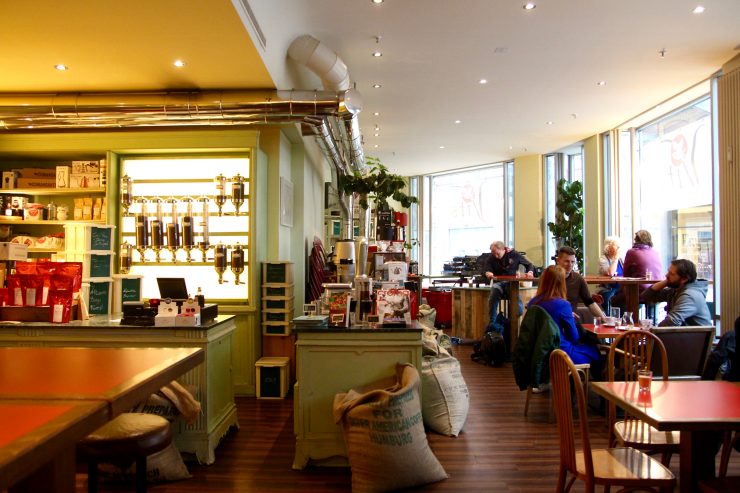
Located close to the famous Viktualienmarkt, Vits der Kaffee might be the oldest coffeehouse offering both classic-style coffees for the neighborhood visitor as well as a broad variety of specialty coffees from around the world. Business consultant Alexander Vits opened the roastery-plus-coffee bar over 10 years ago. Now the coffeehouse is evenly split: half is still devoted to the classic coffeehouse experience for everyone looking for the German tradition of cake and coffee, including the brown wooden Viennese-style coffeehouse chairs.
The other half is a modern specialty coffee business doing direct sourcing and trading (with partners as far away as Peru), holding courses, and serving filter coffees brewed with a broad variety of gear that is also available for purchase. While talking to Wolfgang Helmreich, roaster at Vits, we drank two cups of Panama Esmeralda, a washed Geisha and a natural Catuai. “We are aiming for transparency with everything we do,” he says. “The sourcing, the roasting on our Coffee Tech Ghibli R15, as well as our wholesale business to cafes and restaurants in Munich and Germany-wide.”
Standl 20
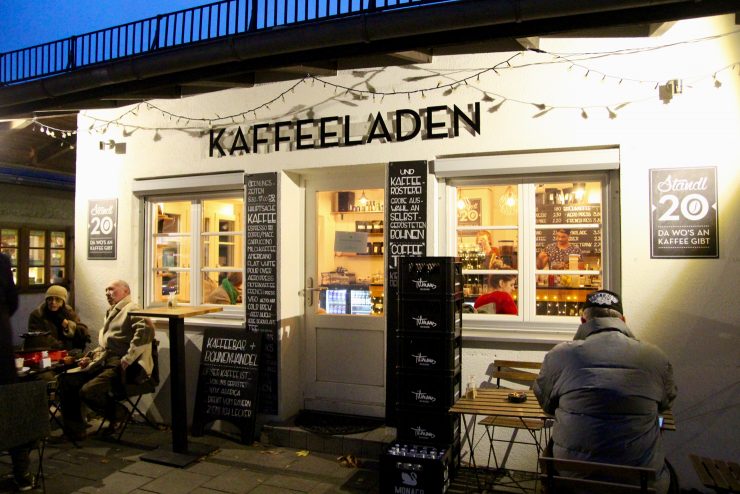
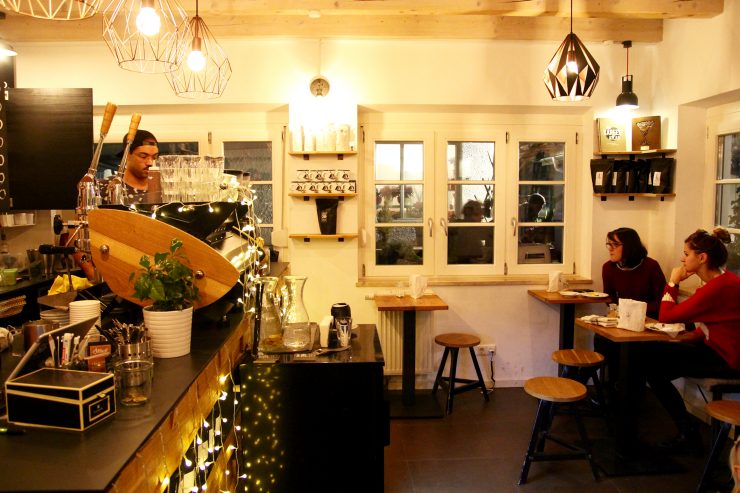
Johannes Bayer, who worked as a barista at Vits while studying, is probably known best to coffee fans as the roaster behind JB Coffee. He is also now the owner of a cafe, Standl 20, which opened in May 2015. Bayer says he’s been in the roasting business for many years already (his studies in education never came to be used) selling his coffees all over Europe, but he’s been underrepresented in Munich itself. After using a short video to introduce the cafe concept behind Standl 20 to the landlords who rent the market stands at Elisabethmarkt, Bayer now runs the only coffee stand at the market, serving coffee from within a tiny space that’s especially cozy during wintertime, when I visited.
Bayer wants to push the creative part of coffee by offering a variety of signature drinks—served hot or cold, depending on the season—with either a Marco batch-brewed filter coffee or an espresso pulled from a custom Kees van der Westen Mirage as their base. The newest addition to the menu is a mokka, which is prepared traditionally in hot sand.
Melanie Böhme is a freelance journalist based in Frankfurt, Germany. Read more Melanie Böhme on Sprudge.
The post The Coffee Guide To Munich appeared first on Sprudge.
seen 1st on http://sprudge.com
No comments:
Post a Comment